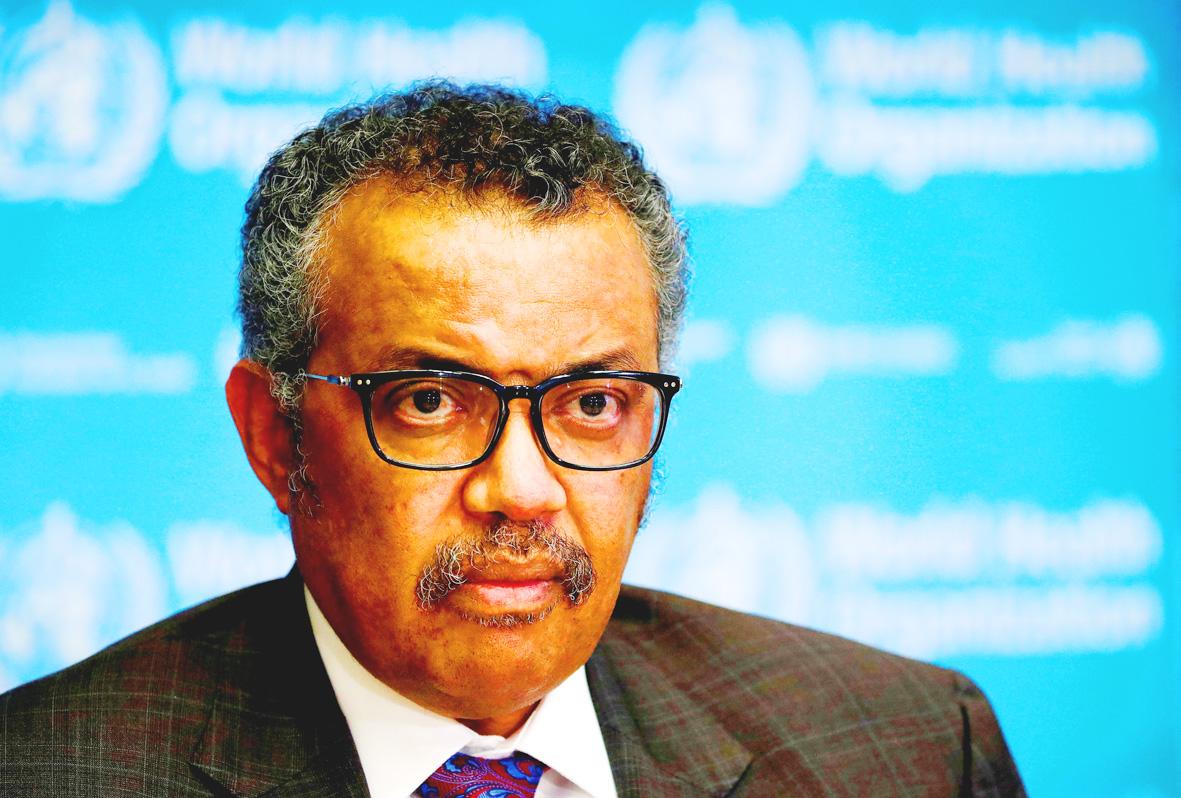The US on Thursday accused the WHO of putting politics first by ignoring early warnings about the novel coronavirus by Taiwan, which voiced outrage over criticism from the UN body’s chief.
US President Donald Trump has gone on an offensive with threats to withhold funding for the WHO, which is at the forefront of fighting the COVID-19 pandemic that late last year emerged in Wuhan, China.
Critics have said that Trump’s sudden threats against the WHO amount to a political ploy to find a foreign scapegoat as he comes under fire for not doing more to prepare for and control the disease.

Photo: Reuters
Trump in January said that the US had the novel coronavirus “totally under control” and predicted that it might go away this month as temperatures rise.
Elaborating on Trump’s case against the WHO, the US Department of State said that the WHO was too late in sounding the alarm over COVID-19 and overly deferential to China.
It questioned why the Geneva, Switzerland-based body did not pursue a lead from Taiwan.
The US is “deeply disturbed that Taiwan’s information was withheld from the global health community, as reflected in the WHO’s January 14, 2020, statement that there was no indication of human-to-human transmission,” a department spokeswoman said.
“The WHO once again chose politics over public health,” she said, slamming the WHO for denying Taiwan even observer status since 2016.
The WHO’s actions have “cost time and lives,” she said.
Taiwan on Dec. 31 last year told the WHO of human-to-human transmission, Vice President Chen Chien-jen (陳建仁) has said.
Chen, an epidemiologist, told the Financial Times that Taiwanese doctors had learned that colleagues in Wuhan were falling ill, but that the WHO did not work to confirm the finding.
WHO Director-General Tedros Adhanom Ghebreyesus, in an appeal for unity, on Wednesday said that he had been subjected to insults including racial slights since the public health crisis began.
The doctor-turned-diplomat did not mention the US — the largest donor to the WHO at more than US$400 million last year — but singled out non-member Taiwan.
The comments sparked anger in Taiwan, which described Tedros’ comments as “baseless” and said that it was seeking an apology for “slander.”
“Our country has never encouraged the public to launch personal attacks against him or made any racially discriminatory comments,” Ministry of Foreign Affairs spokeswoman Joanne Ou (歐江安) told reporters on Thursday.
President Tsai Ing-wen (蔡英文) on Facebook invited Tedros to visit Taiwan and learn from its handling of the epidemic, challenging him to “resist pressure from China.”
Beijing said that Tsai’s Democratic Progressive Party has engaged in “political manipulation” over the WHO.
“Its true aim is to seek independence through the pandemic. We are firmly opposed to this, and their scheme will never succeed,” a Chinese Ministry of Foreign Affairs spokesman said in Beijing.
Critics of Tedros have accused the WHO under his leadership of being too close to Beijing and complimentary of China’s response to the coronavirus.
However, some public health experts have said that the WHO had little choice but to cooperate with China to preserve access to Wuhan.

MAKING WAVES: China’s maritime militia could become a nontraditional threat in war, clogging up shipping lanes to prevent US or Japanese intervention, a report said About 1,900 Chinese ships flying flags of convenience and fishing vessels that participated in China’s military exercises around Taiwan last month and in January have been listed for monitoring, Coast Guard Administration (CGA) Deputy Director-General Hsieh Ching-chin (謝慶欽) said yesterday. Following amendments to the Commercial Port Act (商港法) and the Law of Ships (船舶法) last month, the CGA can designate possible berthing areas or deny ports of call for vessels suspected of loitering around areas where undersea cables can be accessed, Oceans Affairs Council Minister Kuan Bi-ling (管碧玲) said. The list of suspected ships, originally 300, had risen to about 1,900 as

Japan’s strategic alliance with the US would collapse if Tokyo were to turn away from a conflict in Taiwan, Japanese Prime Minister Sanae Takaichi said yesterday, but distanced herself from previous comments that suggested a possible military response in such an event. Takaichi expressed her latest views on a nationally broadcast TV program late on Monday, where an opposition party leader criticized her for igniting tensions with China with the earlier remarks. Ties between Japan and China have sunk to the worst level in years after Takaichi said in November that a hypothetical Chinese attack on Taiwan could bring about a Japanese

MORE RESPONSIBILITY: Draftees would be expected to fight alongside professional soldiers, likely requiring the transformation of some training brigades into combat units The armed forces are to start incorporating new conscripts into combined arms brigades this year to enhance combat readiness, the Executive Yuan’s latest policy report said. The new policy would affect Taiwanese men entering the military for their compulsory service, which was extended to one year under reforms by then-president Tsai Ing-wen (蔡英文) in 2022. The conscripts would be trained to operate machine guns, uncrewed aerial vehicles, anti-tank guided missile launchers and Stinger air defense systems, the report said, adding that the basic training would be lengthened to eight weeks. After basic training, conscripts would be sorted into infantry battalions that would take

DEEP-STRIKE CAPABILITY: The scenario simulated a PLA drill that turned into an assault on Taiwan’s critical infrastructure, with the launchers providing fire support Taiwan yesterday conducted this year’s first military exercises at Longsiang Base in Taichung, demonstrating the newly acquired High Mobility Artillery Rocket System’s (HIMARS) ability to provide fire support and deep-strike capabilities. The scenario simulated an attack on Penghu County, with HIMARS trucks immediately rolling into designated launch areas and firing barrages at the Wangan (望安) and Cimei (七美) islands, simulating the provision of fire support against invading forces. The HIMARS are supposed to “fire and leave,” which would significantly increase personnel and equipment survivability, a military official said. The drill simulated an exercise launched by the Chinese People’s Liberation Army (PLA) Eastern